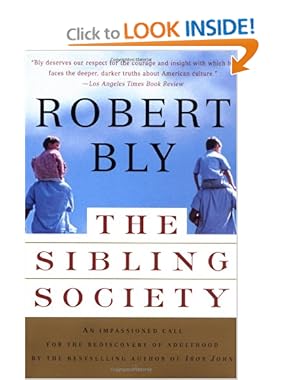Robert Bly's 1996 book The Sibling Society: An Impassioned Call for the Rediscovery of Adulthood has a lot to say to us now, as we try to sort out such matters as the lead story in today's print edition of The Washington Post, "Abuse cases up in military." The story informs us that "The Pentagon, using anonymous surveys and sampling research, estimated that 26,000 personnel experienced 'unwanted sexual contact' last year, up from about 19,300 in 2010, according to an ongoing Defense Department study." That's a two-year increase of 34.7 percent.
Furthermore, the "chief of the Air Force’s sexual assault prevention branch [Lt. Col. Jeffrey Krusinski] was arrested by Arlington County police early Sunday and charged with [wait for it ... ] sexual battery." Krusinski, while drunk at 12:30 a.m. last Sunday morning in a parking lot in Crystal City, Virginia, allegedly grabbed the breasts and buttocks of a civilian woman he did not know. She managed to fend him off and call 911. A 41-year-old officer, he's been relieved of his duties and will either be tried in a civilian court or court-martialed.
The Post story details the ways in which the Defense Department, the military, and Congress are suddenly trying to crack down on sexual assaults and rapes in the armed forces. My attitude is: Good! It's about time!
But it's also, I believe, just putting fingers in a dike that has sprung countless, and enormous, leaks in our society in recent decades. That's where Bly's book comes in.
I've been reading the book for some weeks now and trying to figure out how best to paraphrase it. Bly's notion of a "sibling society" is admittedly hard to grasp. Sibling is, of course, a word that includes our blood brothers and sisters. Bly now extends it outward to include all our age peers. And he says we are now, many or all of us, just "half-adults." (I prefer to call such people "post-adolescents" or "adultescents" instead.)
Bly calls us "siblings" to indicate that we in the last several generations have silenced the erstwhile voices of authority who, traditionally, handed down to us when we were children the norms and ethos of our ancestors. Those norms, that ethos, was derived from the word of God if we are Jews, Christians, or Muslims. If we are from other cultures such as that of the Hindus in India, they came down to us from the small-g "gods."
We've set all that aside, in part because we've become predominantly rationalist-secularist-humanist, and in part because it bears the stink of paternalism. The authority figures that passed along to us the norms and the ethos of our society have always been male — in particular, when we were growing up, our fathers. Today's feminists have labored long and hard to "deconstruct" that aspect of our culture.
Bly applauds feminism and the women's liberation movement — most of it. But he thinks we've tossed the baby out with the bathwater by abolishing the idea of the strong father who lives with his wife and children in a two-parent home and helps initiate his sons and his daughters into true adulthood.


No comments:
Post a Comment